Can You Drink the Water in Spain? Tap Water in Spain 101
Is it safe to drink tap water in Spain? Yes! Read our in-depth guide to tap water in Spain to find out more.
If you’re visiting Spain and wondering if tap water is safe to drink, this post is for you!
Concern over drinking tap water in Spain is valid. Maybe you have gotten sick from foreign food or drink. Or, maybe you’re looking to reduce your plastic waste. Saving money on bottled water in Spain is also a factor.
All that said, it’s certainly understandable why you’d be curious about drinking water in Spain! But, don’t worry, I’m here to help. I’ve lived in Spain as well as traveled extensively across the country.
In this post, we’ll review everything you need to know about drinking water in Spain—from safety to environmental concerns and everything in between.
Can You Drink Tap Water in Spain?

So, is the water in Spain safe to drink?
The answer is, yes! Spain’s tap water is safe to drink.
Historically, water quality in Spain saw some challenges. Between the Civil War and limited infrastructure investment, it gained a reputation for bad water. However, $21 billion in EU significantly improved Spain’s water supply system during 1986-2008.
Today, Spain boasts one of the top water filtration and wastewater management systems worldwide.
To this end, 98.5% of Spain tap water is thought to be safe for human consumption. (1% is unrated, and 0.5% is unfit as of 2021.)
To ensure its safety, water companies in Spain test the water regularly, provide water quality reports, and are required to alert consumers of potential non-compliance issues.
While Spain’s tap water is drinkable, some regions in Spain (like Catalonia and Alicante) have hard water because of high mineral content. Chlorine is added to counteract this—ultimately leading to water that doesn’t take all that great when it reaches the faucet.
Thus, many Spaniards drink bottled water because it tastes better.
It should be noted that microplastics, local pipe contaminants, and higher-than-average levels of trihalomethane (THM) are alarming to some. Nonetheless, the Spanish authorities insist it’s safe to drink tap water in Spain.
Is Spain Tap Water Safe to Drink in These Cities?
Many Spanish cities and regions have excellent tap water in terms of their water source and filtration systems, which lead to good-tasting water. On the negative side, some may have more limited resources.
All in all, how Spanish water tastes depends on where you live or travel to.
Let’s review if tap water is drinkable in some of Spain’s most popular cities.
Can You Drink Tap Water in Madrid?

When it comes to the question of whether it’s safe to drink water in Madrid, you can rest easy knowing that the Spanish capital has some of the cleanest and tastiest water in the entire country!
The secret behind Madrid’s superior tap water quality lies in its source—the pristine Guadarrama mountains.
Madrileños, Madrid’s residents, take pride in their city’s water sources. As such, they consume less bottled water than the rest of Spain. The Household Consumption Database of the Ministry of Agriculture, Fisheries, and Food state that Madrileños drink just 16.7 liters of bottled water per person annually in contrast to the Spanish average of 59.46 liters!
There’s more good news. Staying hydrated in Madrid is easy—there are more than 2,000 public water fountains! Slip a reusable water bottle into your backpack to take advantage of the pure-tasting, free water.
Can You Drink Tap Water in Spain: Barcelona
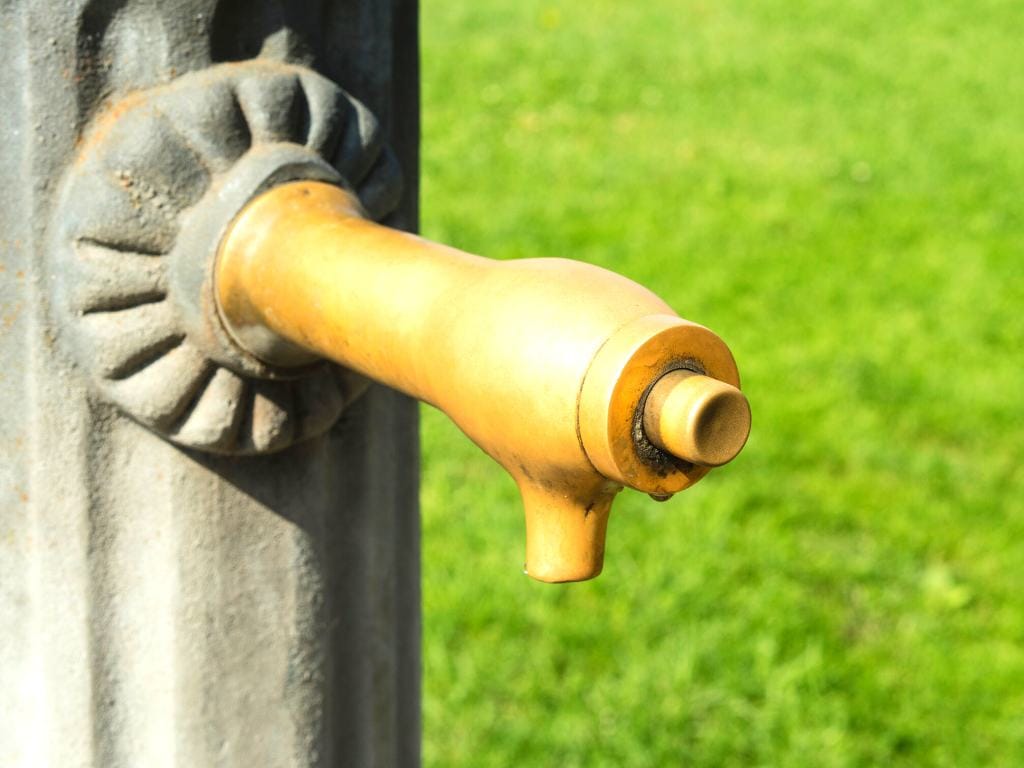
Yes, tap water is safe to drink in Barcelona. Regardless, the coastal city isn’t going to win any taste awards! Instead, many locals opt for bottled water or filtration systems.
Barcelona tap water primarily originates from the nearby Llobregat River and boasts a cutting-edge water treatment plant named ETAP (Estación de Tratamiento de Agua Potable).
Yet, the high-mineral river contributes to what’s called “hard water,” a result of elevated levels of lime or calcium and magnesium ions. While perfectly safe to drink, it might not be the most flavorful choice of Spain’s drinking water.
The icky-tasting water situation extends throughout Catalonia including along the glorious Costa Brava. Be prepared.
Can You Drink Tap Water in Alicante?
When it comes to the tap water in Alicante, there are a few things to keep in mind. Firstly, the water in Alicante is safe to drink.
Although Alicante tape water is safe, it’s hard. This means it has high mineral content, especially calcium (aka limescale).
You’ve probably seen limescale before. It’s the stubborn white residue in kettles, on faucets, or glassware.
Luckily, limescale isn’t harmful to health.
Many locals attribute the unpleasant taste of Alicante’s water to its hardness. But, it’s actually because high chlorine levels are used for disinfection.
If you’re looking to enjoy the water in Alicante without a chlorine aftertaste, a water filter bottle or bottled water might be your best bet.
Can You Drink Tap Water in Málaga?

As far as tap water in Málaga, safety isn’t an issue—you won’t get sick from drinking it. It actually undergoes daily testing according to stringent international quality standards.
So bring a reusable bottle, and fill it up at a local water fountain!
Be warned, however, the water’s taste is less than appetizing. The water in the Málaga province tends to be hard, which means it contains high mineral levels that affect its flavor.
To emphasize, more than 70% of the local population prefers bottled water or uses water filters because of the water’s funky taste!
If you’re in the region, chilling the tap water or using a water filter can help.
Is Seville Tap Water Safe?
Yes, the tap water in Seville is safe for drinking.
Sourced from the Guadalquivir River just upstream of the city, the water may have a subtle taste of chlorine or minerals.
It seems that many people drink tap water at home, but choose bottled water in restaurants or while out and about for convenience.
Public drinking fountains in Seville are clearly marked as safe to drink. You can find them in many squares and public spaces, especially in tourist-heavy areas.
Can You Drink Tap Water in Mallorca?
Domestic and hotel tap water supplies in Mallorca are considered safe for consumption, except for a handful of locations on the island.
Conversely, because of the limestone-rich nature of the water sources, water in Mallorca tends to be hard—which leads to a mineral and chlorine-heavy taste. There have also been reports of it containing too many nitrates.
When asking residents about tap water, most of them will tell you to buy bottled water. Some of them believe it’s not safe. Correspondingly, only 34% of Palma’s residents regularly consume tap water (that includes those with filtration systems).
How is the Tap Water in Valencia, Spain?
The good news is that tap water in Valencia meets the stringent quality criteria set by the European Union and the World Health Organization.
Contrarily, their sophisticated water treatment systems don’t necessarily equate to taste. The high concentrations of calcium in the Júcar and the Túria rivers require a lot of chlorine to be added during the purification process.
In short, only 20% of Valencia residents opt for tap water!
Can You Drink the Water in Lanzarote?
Yes, tap water in Lanzarote is generally safe to drink. However, since the water is desalinated, you will probably detect an odd taste owing to the water treatment methods.
Many residents purchase large bottles of water from the grocery store instead of opting for Lanzarote drinking water. You might prefer to buy bottled water or use a water filter bottle to help mask the taste when visiting the Canary Islands.
What About Bottled Water in Spain?

For many Spaniards (and tourists) drinking bottled water is a given. And yes, bottled water is readily available in Spain at any supermarket.
But, how did bottled water become so popular?
When Spain’s tourism industry picked up in the late 1960’s, Spain had a reputation for unsafe water (perhaps owing to the taste). In those days, locals would reportedly advise against drinking water in Spain. Many Spaniards also opted for bottled water—and still drink it to this day.
Significantly, Spain is the fourth largest consumer of bottled mineral water in the world. Spain will overtake Italy and France too, leaving only Germany in front (Source: ANEABE).
The rise in the consumption of bottled mineral water in Spain has been steady, too. In 1965, 74 million glass bottles were consumed. Today, that number has risen to 6-8 billion plastic bottles per year!
If those stats don’t say something about Spaniards’ (and tourists’) preference for bottled water, I don’t know what does.
Unsurprisingly, all those plastic bottles (of which approximately 30% are recycled) are contributing to a larger issue: plastic is infiltrating our water supply as it ends up in the groundwater, rivers, and oceans.
All things considered, it’s up to you whether you choose to drink tap or bottled water in Spain!
Is Tap Water Safer than Bottled Water in Spain?
A question comes up about Spain’s bottled water consumption: is bottled mineral water any safer than tap water in Spain?
As stated, the tap water in Spain is safe to drink. It’s subject to rigorous international quality standards and regulations. It’s also affordable and can be sourced locally.
Why then, do Spaniards drink 120 liters of mineral water per capita, on average? (Source: Asociación Nacional de Empresas de Aguas de Bebida Envasadas).
The belief that 64 oz/day is required to stay healthy, the low cost of bottled water, and the convenience, for starters. Additionally, the taste of bottled water and perceived health benefits from its minerals contribute to Spain’s high bottled water consumption.
Despite the perceived superiority of bottled water, some experts say there is no scientific evidence that bottled water is healthier than tap water. As far as safety goes, bottled water is held to its own set of safety standards.
It’s important to realize that there can be safety issues with bottled water, too. For example, an April 2016 Norovirus outbreak in Catalonia in April 2016 was traced back to bottled water from an Andorran spring!
To sum it up, it appears choosing bottled water over Spanish tap water hinges on more than just safety concerns.
What is the Best Bottled Water in Spain?
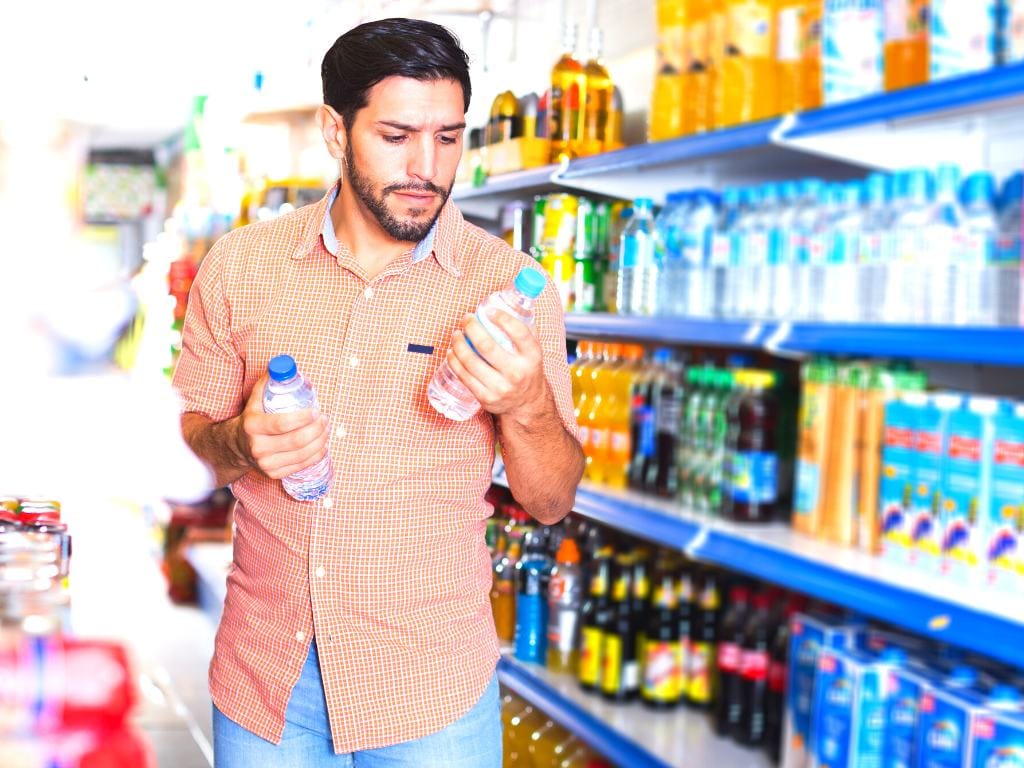
If you prefer drinking bottled water, you can easily find it in any grocery store. You’ll find an entire row of water bottles in all sizes.
Plus, Spanish bottled water is affordable! 1.5 liters costs less than $0.83 (0.75€).
When shopping for mineral water in Spain, pay attention to the label. Both still (agua sin gas) and carbonated water (agua con gas) are popular, and you’d hate to get the wrong one!
Several mineral water brands are popular in Spain. Some of the well-known Spanish bottled water brands include:
- Bezoya: One of the most recognized mineral water brands in Spain, known for its high-quality water sourced from the mountains
- Solán de Cabras: Sourced from the Cuenca region, it has a smooth taste and unique mineral composition
- Font Vella: A very popular choice for its refreshing taste, sourced from natural springs
- Vichy Catalan: Carbonated mineral water with a distinctive taste and effervescent quality
- Lanjarón: Pure and refreshing; sourced from the Sierra Nevada.
When to Drink Bottled Water in Spain
If you’re trying to avoid bottled water, there are times when it makes sense to buy water:
- When you go to an upscale restaurant, you’ll be expected to order a drink.
- If you want a free tapa, you’ll need to pay for a drink to get it.
- If you order a 3-course fixed-price meal (menú del día), bottled water could count as your included drink.
- When you’re out and about and need water, by all means, buy a bottle of water! You don’t want to get dehydrated or miss a dosage of pills because you’re out of water, for instance.
Tap Water Spain: Restaurants

Is it okay to drink tap water in Spain at restaurants?
Read on to learn more about restaurant etiquette in Spain as it relates to drinking water.
Can you Get Free Tap Water in Spanish Restaurants?
Yes, you can get free tap water in Spanish restaurants.
While many establishments in Spain already served tap water if requested, a new law passed in Spain in April 2022 requires all restaurants and bars to provide free tap water to patrons.
Markedly, the law was enacted in an effort to cut down on plastic waste.
Local authorities must also provide ample public drinking fountains. You’ll see some cities have really taken the idea to heart. (Water fountains should be clearly marked if not safe for consumption.)
How to Order Water in Restaurants in Spain
If you’re from the United States, surely you’re used to getting a glass of water at restaurants. Sometimes, the server doesn’t even ask if you want water!
In contrast, at bars, cafes, or restaurants in Spain, you need to order tap water.
Moreover, you’ll need to specify that you want water from the tap. Otherwise, waiters tend to default to bottled water (although don’t be afraid to ask for tap water instead if they bring the wrong one).
More recently, though, I’ve noticed waiters asking me which I’d like: bottle (embotellada, botella, botellín) or tap (grifo, vaso). It’s likely because it makes sense to clarify upfront now that people are aware they can drink free tap water.
If ordering bottled water in Spain, you should also clarify if you want it flat (sin gas) or sparkling (con gas).
Here are some basic ways to order a glass of water in Spanish:
—¿Me traes agua del grifo?
—Can you bring me some tap water?
—¿Me traes un vaso de agua?
—Can you bring me a glass of water?
If you would prefer to order a bottle of water, say:
— Una botella de agua mineral, por favor.
—A bottle of mineral water, please.
—Querría un botella de agua con gas, por favor.
—I’d like a bottle of sparkling water, please.
Is it Safe to Have Ice in Drinks in Spain?
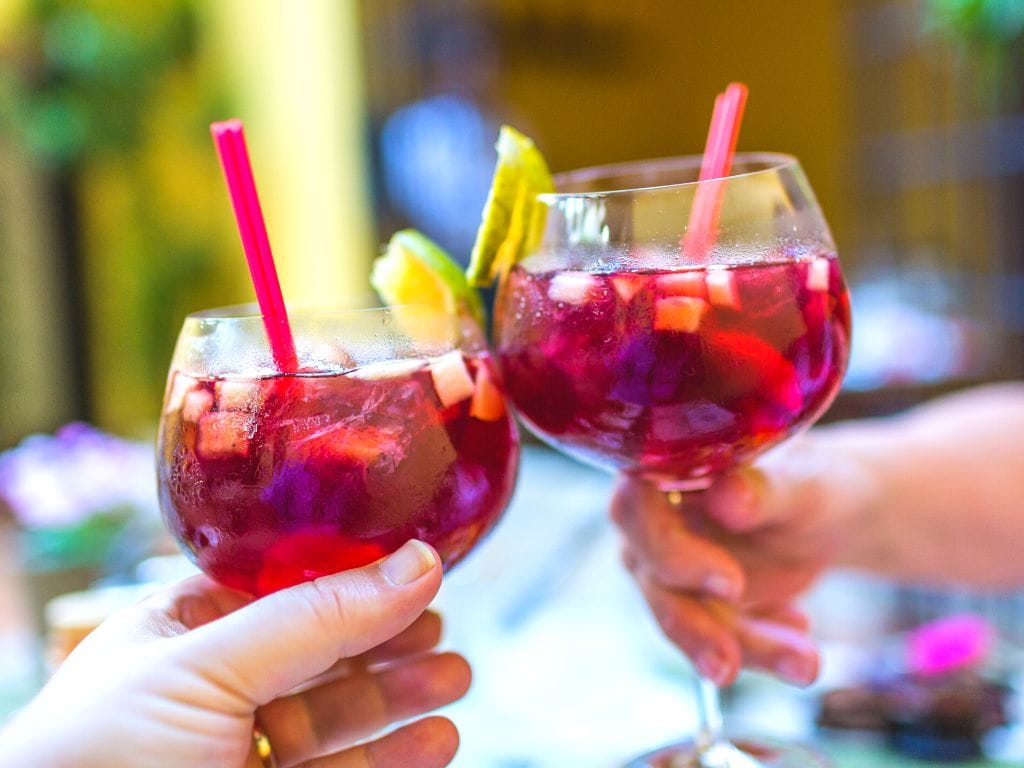
Seeing as tap water in Spain is safe to drink, it’s okay to have ice in Spain.
In general, ice cubes in Spain will come from two places: from the tap or in ready-made bags.
The ice served in restaurants and bars typically comes from store-bought bags which are considered safe since they are subjected to health and safety regulations similar to bottled water.
If you’re staying at an apartment rental, you can make ice from the tap, or opt to buy a bag of ice. You can bags of ice at practically any grocery store.
Either way, ice in Spain is safe to consume.
Top Tip: In case you don’t want an ice-cold drink, you can ask for a glass of water without ice in Spanish by saying agua sin hielo.
Water Filters for Tap Water in Spain
Water filters are a reliable and cheap solution for improving tap water taste and water quality in Spain. Let’s explore some of the available options.
Water Filters in Spain
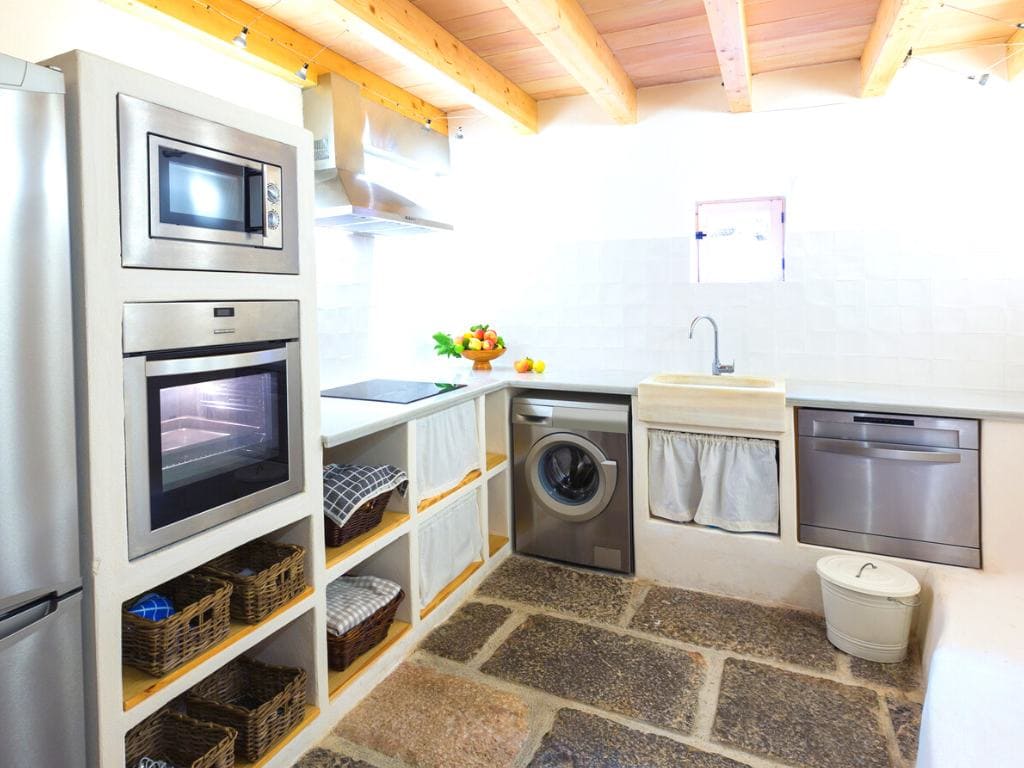
If you live in Spain, you may want to consider installing a filter on your water faucet. These will purify your water, not to mention save money and reduce plastic waste.
These professional filters are designed to eliminate unwanted tastes, odors—such as chlorine—and contaminants like microplastics, lead, and pesticides, among others.
Additionally, you can save money over time compared to purchasing bottled water. The average household in Spain spends about $350 (€320) per year on bottled water. In comparison, a water filter could cost as little as $88 (€80) annually!
Companies like TAPP Water and Laboratorio Aqua Vitae specialize in providing water filters in Spain and other European countries.
Best Water Filter Bottles for Spain
While water filter bottles aren’t essential for travel in Spain, they’re a good investment for avid travelers. The filters on water filter bottles vary by brand. Many feature a replaceable filter that reduces chlorine taste, odors, and contaminants.
Is Tap Water in Spain Safe to Drink: FAQ’s
Where is the best tap water in Spain?
While water quality can differ across Spain, several regions are recognized for their particularly satisfying tap water. Cities like Madrid, Bilbao, Vigo, and A Coruña have made headway in water filtration and management systems. The results: safe and delicious tap water. In addition, reports have highlighted Burgos, San Sebastián, and even Granada for their satiating tap water.
Can you brush your teeth with Spanish water?
Yes, you can safely brush your teeth with tap water in most parts of Spain. The tap water is generally treated and meets safety standards for consumption, which includes its suitability for brushing your teeth. However, if you have a particularly sensitive stomach or are concerned about the taste or quality of the water, you might prefer to use bottled water for brushing your teeth during your stay.
Do Spanish people drink tap water?
Yes, many Spanish people do drink tap water. Although 98.5% of Spain’s tap water is safe to drink, a lot of Spaniards actually prefer bottled water due to the taste or concerns about water quality in certain regions. Bottled water is also readily available and cheap to purchase.
Is Spain tap water drinkable in hotels?
Yes, tap water in hotels in Spain is generally safe to drink. If you have concerns about the taste or quality of tap water in a particular hotel, inquire at the hotel’s reception desk. Nevertheless, some travelers prefer bottled water for drinking. But for tasks like brushing your teeth, showering, or boiling water for tea, they feel more comfortable. In any case, tap water in Spanish hotels is considered safe.
Is water in Spain safe to drink at home or in an Airbnb?
Yes, tap water in homes in Spain is typically safe to drink. This includes if you’re renting long-term or staying at an apartment rental or Airbnb. Many people will have installed a water filter already on their tap to improve the taste and quality. If you have any doubts about the tap water drinkability, you can ask the owner.
Can I drink the water in Spain from water fountains?
Yes, you can typically drink from public water fountains in Spain. To tackle the plastic problem, many cities have water fountains. These fountains are supposed to be maintained and regularly checked for water quality. However, it’s a good practice to visually inspect the fountain and use your judgment. If you don’t feel comfortable drinking directly from the fountain, you can use bottled water or a personal water bottle with a filter.
If a water fountain is not potable (unsafe to drink), it will be clearly identifiable with a sign with something like:
–No bebas el agua – Don’t drink the water
–No potable – Not potable
-A picture of a water glass or spigot with an X over it
Can you use tap water to boil pasta in Spain?
Yes, you can use tap water to boil pasta, prepare coffee, and wash fruit and vegetables with tap water in Spain. In general, using tap water to cook is a safe and common practice in Spain. In the case of pasta, boiling water will further ensure its safety by eliminating any potentially harmful microorganisms.
Is tap water in Spain safe in Spain for babies?
Yes, tap water is typically safe for babies in most developed countries, including Spain. The tap water in Spain meets strict safety and quality standards set by regulatory authorities. Regardless, some parents choose to use bottled water or boil tap water before giving it to their babies or mixing it with dry formula. It’s important to consult with your pediatrician for an informed recommendation.
Is there safe drinking water on the Camino de Santiago?
Yes, along the Camino de Santiago, there are numerous sources of drinking water available to pilgrims. Many villages, towns, and rest stops along the different Camino routes provide access to tap water from public and private water sources. It’s important to remember that the water sources along the Camino are intended for pilgrims to use. As a precaution, ask a local and look for signs indicating if water is/is not potable.
What is the most popular mineral water in Spain?
Vichy Catalan is Spain’s most popular sparkling mineral water. Sourced from a renowned Catalan hot spring with supposed healing properties, it’s been said to soothe upset stomachs. With 27 essential minerals including calcium, magnesium, and potassium, Vichy provides a healthful option that many Spaniards love.
Is it safe to drink water in Spain if I have a sensitive stomach?
The average traveler should have no issues adjusting to tap water in Spain. Be that as it may, if you have a sensitive stomach, you could consider these precautions when it comes to tap water in Spain: boil water before consumption, opt for bottled water, get a water filter like Lifestraw, gradually introduce tap water into your routine, and/or consult a professional.
Is the water safe to drink in Spain when it comes to microplastics?
The prevalence of microplastics in Spain’s water supply is a growing concern. As plastics find their way into oceans and rivers, they break down into minute particles that infiltrate tap water. European tap water, including Spain’s, has a contamination rate around 80%. Although long-term health impacts are uncertain, it’s wise to consider filtering your tap water and avoiding single-use plastics.
How do you make tap water taste better?
To improve the taste of tap water, you can try a few methods. Chilling the water in the fridge or adding a slice of lemon or lime can make the flavor more pleasant. Using a water filter can also remove chlorine and other impurities that affect taste. Lastly, allowing tap water to sit for a while can help dissipate any strong flavors.
How do you say bottled water in Spanish?
In Spanish, “bottled water” is commonly referred to as agua embotellada. Less frequently, you may hear agua en botella. Or you could say, a bottle of water which would be una botella de agua. In Spain, it’s common to refer to bottled water as agua mineral or simply agua (as it’s implied you are asking for a bottle.)
How do you say cold water in Spanish?
Cold water in Spanish is agua fría. In parts of Spain, they will say agua fresca or aqua fresquita for cold water in Spanish.
How do you say sparking water in Spanish?
The most common way to say sparkling water in Spanish is agua con gas. Carbonated water, soda water, or fizzy water are all similar variations: agua carbonatada, agua gasificada, or agua gaseosa will get your point across. Soda can work too, if you’re ordering a drink at a bar, for instance.
How do you say hot water in Spanish?
You may want to ask for hot water while traveling in Spain to make tea, for example. Hot water in Spanish is agua caliente. Boiling water is agua hirviendo.
Last Words: Is Tap Water Safe to Drink in Spain?
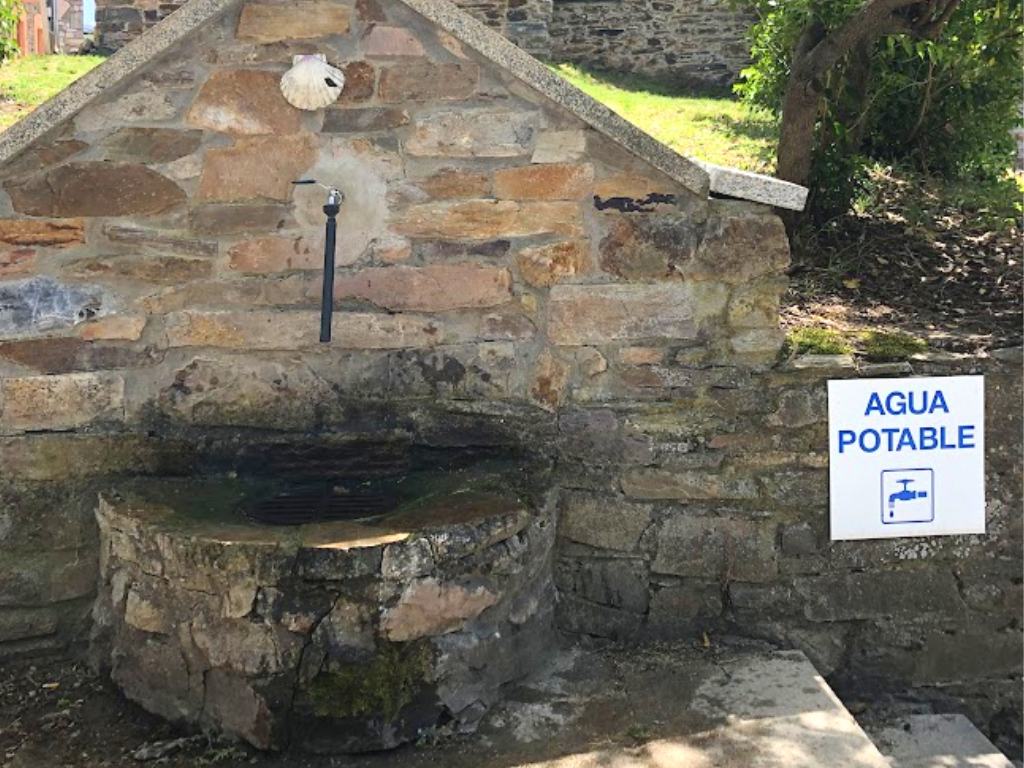
In conclusion, tap water in Spain is okay to drink. Advanced filtration systems ensure its quality. Despite the fact that water is safe to drink in Spain, individual preferences vary with many locals choosing bottled water over tap.
Buying bottled water or carrying a water bottle filter are options if you’re concerned about the taste of water from the faucet in Spain.
Navigating Spain’s tap water can be as refreshing as its local beverages. And speaking of which, in Spain, wine is cheaper than water—a tempting twist on hydration, indeed!
